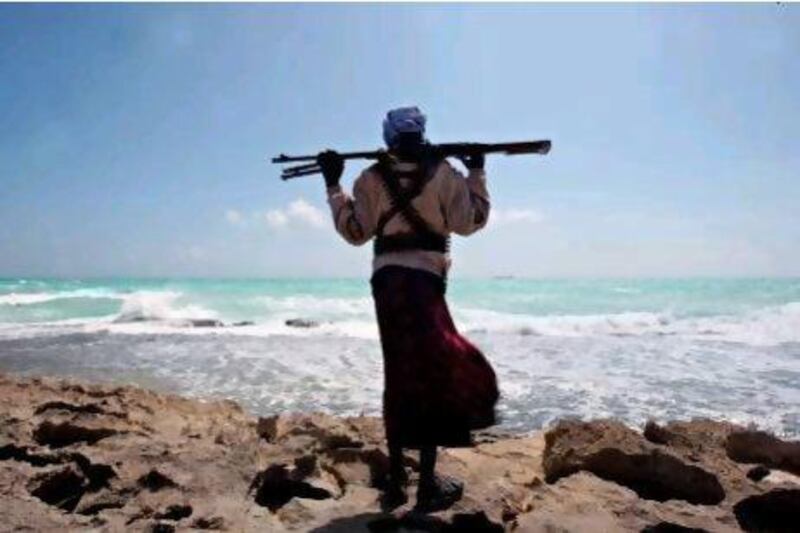Amid the rough-clad longshoremen offloading containers, the docks at Dar Es Salaam, Tanzania, were until recently also bustling with tourists in gaudy shirts.
No longer - since Somali pirates started operating further south, the visitors have stayed away.
According to Tanzanian government figures, 57 attacks have occurred off its territorial waters over the past year. Up to 300 attacks, some as far south as Mozambique, have taken place over the past six years off the African coastline.
The cost to the east African economy is vast. Fishing, a mainstay of coastal communities, has fallen by a third, according to the Rosa Luxemburg Foundation for Southern Africa. The Seychelles, which derives 40 per cent of its income from fishing, has seen its economy lose almost 10 per cent of its GDP as a result of Somali buccaneering.
Conversely, for some however, the pirates have been a windfall.
"Piracy is a relatively sophisticated business requiring significant labour and investment from local communities," says Anja Shortland, a researcher with Chatham House in London, who has carried out an extensive study into the economics of pirating.
She says the taking of the Albedo, a Pakistan-registered cargo ship that was hijacked in the Gulf of Aden in 2010 and finally released last month, provides an accurate case study. During the 17 months the vessel was held, a round-the-clock guard of 100 men was required, who would have needed food, water and khat (a stimulant plant chewed by many in the region) for their cooperation.
Drivers, mechanics, cooks and other support services were also needed to keep the "garrison" supplied. Add to this the fuel required to keep the ship's diesel generators running to provide lights, and the costs incurred by the pirates would have been substantial. The ransom was eventually settled at US2.75 million (Dh10.1m), a figure lower than the average settlement price of about $4.5m, says Ms Shortland.
"The final amount, while probably rather disappointing to the pirates, is still very significant compared to other business opportunities in coastal Puntland," she says. The buccaneers took about $100m in 2010, and the estimate for last year could be as high as $150m.
"As a best guess, around a third of these ransoms probably find their way into the local economy, another significant part circulates in the parallel US dollar-denominated economy and a further part is spent on foreign imports such as khat and SUVs," says Ms Shortland.
But what's good for Somalis is not necessarily good for other African countries. International efforts that have seen shipping nations band together - including unlikely allies such as the US and Iranian navies - have reduced pirate attacks off the Somali coast and along the Gulf of Aden. Consequently pirates have begun moving south and eastwards.
The Seychelles has been particularly hard hit. The Indian Ocean archipelago depends on fishing and tourism, especially chartered yachting, for much of its income. But these have been crippled by pirate raiders, who at times brazenly snatch victims from close to the island's shores .
Tanzania has estimated pirating will cost it $4m this year, after more than 50 foreign firms cancelled contracts to harvest its waters, for fear of having their vessels captured. Even Mozambique and Madagascar are not unaffected. Vessels have been seized in the waters off both these countries.
Of the countries on Africa's eastern seaboard, only South Africa has a credible navy. This leaves vulnerable countries heavily dependent on international efforts to keep their oceans free of pirates. But as these operations tend to focus on northern trade routes, pirates are beginning to move further south.
"Historically, the unintended consequence of increased naval operations off the coast of Somalia resulted in the pirates developing their operations to include 'motherships', which allowed then a much greater operational range," says Captain Phil Holihead, the programme manager for the International Maritime Organisation's (IMO) counter-piracy project.
Capt Holihead says the IMO is considering assisting these countries, and helping them use what vessels they have more effectively. That can include helping with intelligence gathering so they are given warning when suspect vessels enter their waters, enabling them to improve their response time.
"A commonly shared picture will give the regional navies the ability to regionally assess the immediate problems and be in a position to burden-share so that the most effect is gained from a small number of ships," he says.
A conference was recently held in Cape Town, South Africa, to bring together the disparate African forces. Captain King Chiragi, of the Tanzanian navy, summed up the challenge in tracking illegal activities across the huge swathe of Indian Ocean with a motley collection of patrol craft: "Pirates pose as fishermen and therefore you could come across them, but not be able to identify them," he said.
"There are many fishing vessels on the seas."
twitter: Follow our breaking business news and retweet to your followers. Follow us





